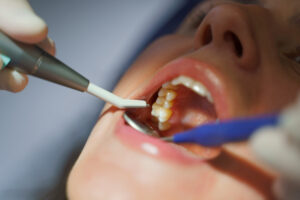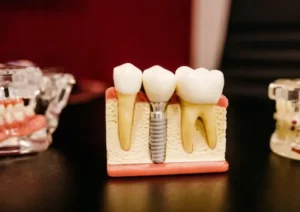Accidents happen, and sometimes they involve something as shocking as a knocked-out tooth. Whether it’s from a sports injury, an unexpected fall, or even biting down on something too hard, losing a tooth is a traumatic experience. But what should you do when a tooth gets knocked out? Can you just pop it back in yourself, or do you need to rush to a dentist? This article explores the steps to take when you knock out a tooth, what a dentist can do, and what to expect from tooth replacement procedures.
Can a Knocked-Out Tooth Be Put Back In by a Dentist?
Yes, a knocked-out tooth can sometimes be put back in, but only by a dentist. If your tooth is completely knocked out, the best chance of saving it is to get to a dentist within 30 to 60 minutes. The sooner you can see a dentist, the better the chances of successfully reattaching the tooth to the bone.

However, this isn’t something you can easily do at home. The process of reinserting and securing a knocked-out tooth requires specialized knowledge and tools that only a dentist can provide. The dentist will clean the tooth, ensure the socket is ready, and carefully place the tooth back in its original position. In many cases, the dentist will also need to use a splint or bonding agent to hold the tooth in place while it heals.
How Do Dentists Replace a Knocked-Out Tooth?
If you’ve knocked out a tooth, your dentist will evaluate the condition of both the tooth and the empty socket to determine the best course of action. There are a few options available depending on the extent of the injury:
- Reimplanting the tooth: If the tooth is intact and the root hasn’t been damaged, the dentist may attempt to reimplant it. This involves carefully placing the tooth back into the socket and securing it with a temporary splint to neighboring teeth to keep it stable while it heals.
- Bonding a chipped tooth: If your tooth is chipped or broken rather than fully knocked out, your dentist may be able to bond the tooth back together. This involves using a special adhesive to repair the chipped portion of the tooth. This method works for minor chips or fractures but isn’t an option for a fully avulsed tooth.
- Veneers: In cases where a large portion of the tooth is damaged or the appearance is affected, your dentist might suggest a veneer. A veneer is a thin shell that covers the front of the tooth to improve its appearance and restore functionality.
- Dental implants or bridges: If reimplanting the tooth isn’t possible, the dentist may recommend more permanent solutions like dental implants or bridges. These options help restore your smile and prevent future dental issues, such as shifting teeth or bone loss, that can occur when a tooth is missing.
Can You Reinsert a Knocked-Out Tooth at Home?
It might be tempting to try and put a knocked-out tooth back in yourself, but this is not recommended. While it’s crucial to keep the tooth moist and handle it carefully, reinserting the tooth is a job for a dentist. Placing it back in the socket on your own could cause more damage, especially if the root is touched or if the socket is not clean.
If you lose a tooth, here’s what you should do instead:
- Pick up the tooth by the crown (the white part you can see) and avoid touching the root (the part that was in the gum).
- Gently rinse the tooth with water if it’s dirty, but don’t scrub it or use soap, toothpaste, or chemicals.
- Place the tooth in a container of milk or keep it moist in your mouth by holding it between your cheek and gums.
- Get to a dentist as soon as possible—ideally within 30 minutes to an hour.
While it might seem convenient to pop the tooth back in yourself, doing so incorrectly could harm the root, reduce the chances of successful reattachment, or cause an infection. Always leave this task to a professional.
How Long Do You Have to Get a Knocked-Out Tooth Replaced?
When a tooth gets knocked out, time is of the essence. The best chance of saving the tooth comes when it’s reimplanted within 30 minutes to an hour after the injury. After an hour, the chances of the tooth reattaching to the bone significantly decrease.
However, if you can’t make it to a dentist within this time, all is not lost. The tooth should still be kept moist and taken to the dentist as soon as possible. While the likelihood of a successful reimplantation decreases after 60 minutes, a dentist may still attempt to save it.
What Happens If You Leave a Knocked-Out Tooth Untreated?
If you lose a tooth and don’t seek treatment, several complications can arise. These include:
- Infection: Leaving the empty socket untreated can lead to infections in your gums and jawbone. This is especially true if the tooth’s root has been damaged.
- Shifting teeth: Your teeth naturally shift to fill empty spaces, so leaving a missing tooth untreated can cause your other teeth to move out of alignment. This can lead to bite issues and problems with chewing.
- Bone loss: The roots of your teeth stimulate the jawbone, keeping it strong and healthy. Without a tooth in place, the jawbone may begin to deteriorate over time, which can change the shape of your face and weaken the structure of your remaining teeth.
- Difficulty chewing or speaking: A missing tooth can make it harder to chew or speak properly, which can affect your overall quality of life.
How Permanent Are Tooth Reimplantations?

The success of a reimplanted tooth depends on various factors, such as how long the tooth was out of the socket, how well the tooth and socket were cared for after the injury, and whether the tooth was reimplanted correctly.
In some cases, a reimplanted tooth can last for many years, but it may eventually need further treatment. For instance, if the root becomes damaged or the nerve inside the tooth dies, a root canal may be required to remove the dead tissue and prevent infection.
Even if the tooth successfully reattaches, it’s possible that you’ll need future treatments to maintain it. Regular dental check-ups and good oral hygiene are essential to keeping a reimplanted tooth healthy.
What Are the Alternatives If a Knocked-Out Tooth Can’t Be Saved?
Sometimes, despite your best efforts and the dentist’s intervention, a knocked-out tooth can’t be saved. In these cases, there are still several options available to restore your smile and functionality:
- Dental implants: A dental implant is a popular and permanent option. It involves placing a titanium post in the jawbone to act as a replacement root, with a crown (artificial tooth) placed on top. Dental implants look and function like natural teeth.
- Bridges: If you have neighboring teeth next to the missing tooth, a dental bridge can be used. This involves creating a false tooth that is held in place by crowns on the adjacent teeth.
- Dentures: For those missing multiple teeth, partial dentures can be created to fill the gap. Dentures are removable and less invasive than implants but still provide a functional solution.
Each of these options has its pros and cons, and your dentist can help you choose the right one based on your individual needs.
How to Prevent a Knocked-Out Tooth in the Future
While accidents can’t always be avoided, there are steps you can take to reduce your risk of losing a tooth:
- Wear a mouthguard: If you play contact sports or engage in activities that could lead to a tooth injury, wear a mouthguard to protect your teeth.
- Avoid chewing hard objects: Biting down on ice, popcorn kernels, or hard candy can put extra stress on your teeth and increase the risk of them getting damaged.
- Practice good oral hygiene: Strong, healthy teeth are less likely to break or get knocked out. Brushing, flossing, and regular dental check-ups are important for maintaining the strength of your teeth.
Conclusion
A knocked-out tooth can be a scary experience, but with prompt action and the right treatment, there’s a good chance of saving it. The key is to handle the tooth carefully, keep it moist, and get to a dentist as soon as possible. Remember, while it’s tempting to try and reinsert the tooth yourself, this is a delicate procedure best left to professionals.
If the tooth can’t be saved, there are plenty of options, from dental implants to bridges, that can restore your smile and prevent future complications. Taking steps to protect your teeth, such as wearing a mouthguard during sports and practicing good oral hygiene, can also help reduce the risk of losing a tooth in the future.

